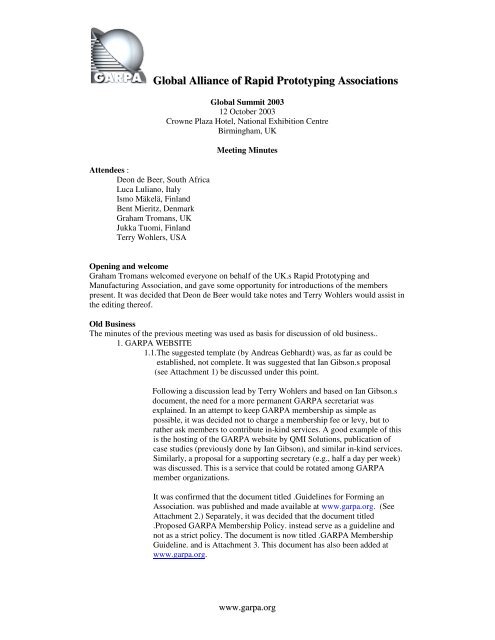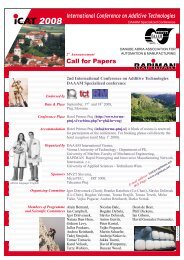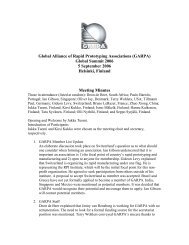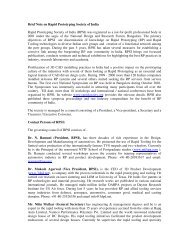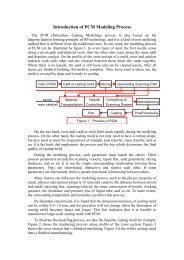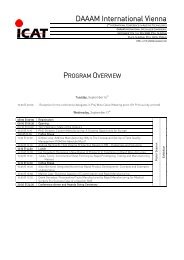Meeting minutes - Global Alliance of Rapid Prototyping Associations ...
Meeting minutes - Global Alliance of Rapid Prototyping Associations ...
Meeting minutes - Global Alliance of Rapid Prototyping Associations ...
Create successful ePaper yourself
Turn your PDF publications into a flip-book with our unique Google optimized e-Paper software.
Attendees :<br />
Deon de Beer, South Africa<br />
Luca Luliano, Italy<br />
Ismo Mäkelä, Finland<br />
Bent Mieritz, Denmark<br />
Graham Tromans, UK<br />
Jukka Tuomi, Finland<br />
Terry Wohlers, USA<br />
<strong>Global</strong> <strong>Alliance</strong> <strong>of</strong> <strong>Rapid</strong> <strong>Prototyping</strong> <strong>Associations</strong><br />
<strong>Global</strong> Summit 2003<br />
12 October 2003<br />
Crowne Plaza Hotel, National Exhibition Centre<br />
Birmingham, UK<br />
<strong>Meeting</strong> Minutes<br />
Opening and welcome<br />
Graham Tromans welcomed everyone on behalf <strong>of</strong> the UK.s <strong>Rapid</strong> <strong>Prototyping</strong> and<br />
Manufacturing Association, and gave some opportunity for introductions <strong>of</strong> the members<br />
present. It was decided that Deon de Beer would take notes and Terry Wohlers would assist in<br />
the editing there<strong>of</strong>.<br />
Old Business<br />
The <strong>minutes</strong> <strong>of</strong> the previous meeting was used as basis for discussion <strong>of</strong> old business..<br />
1. GARPA WEBSITE<br />
1.1.The suggested template (by Andreas Gebhardt) was, as far as could be<br />
established, not complete. It was suggested that Ian Gibson.s proposal<br />
(see Attachment 1) be discussed under this point.<br />
Following a discussion lead by Terry Wohlers and based on Ian Gibson.s<br />
document, the need for a more permanent GARPA secretariat was<br />
explained. In an attempt to keep GARPA membership as simple as<br />
possible, it was decided not to charge a membership fee or levy, but to<br />
rather ask members to contribute in-kind services. A good example <strong>of</strong> this<br />
is the hosting <strong>of</strong> the GARPA website by QMI Solutions, publication <strong>of</strong><br />
case studies (previously done by Ian Gibson), and similar in-kind services.<br />
Similarly, a proposal for a supporting secretary (e.g., half a day per week)<br />
was discussed. This is a service that could be rotated among GARPA<br />
member organizations.<br />
It was confirmed that the document titled .Guidelines for Forming an<br />
Association. was published and made available at www.garpa.org. (See<br />
Attachment 2.) Separately, it was decided that the document titled<br />
.Proposed GARPA Membership Policy. instead serve as a guideline and<br />
not as a strict policy. The document is now titled .GARPA Membership<br />
Guideline. and is Attachment 3. This document has also been added at<br />
www.garpa.org.<br />
www.garpa.org
<strong>Global</strong> <strong>Alliance</strong> <strong>of</strong> <strong>Rapid</strong> <strong>Prototyping</strong> <strong>Associations</strong><br />
On the issue <strong>of</strong> member organisations not necessarily being nationally<br />
representative, it was decided to keep the status-quo, especially in terms <strong>of</strong><br />
founding members, and to apply .positive energy. on members to become<br />
.nationally representative. and active. It was again stressed that member<br />
associations should be .inclusive,. and that GARPA should safeguard these<br />
principles.<br />
Future members should be kept to these principles. Serious objections by<br />
companies or institutes that feel their country is not represented by a<br />
national organisation will be handled by GARPA on an individual basis.<br />
New countries that apply for GARPA membership will be expected to<br />
provide pro<strong>of</strong> <strong>of</strong> membership circulation before admission.<br />
1.2. On the issue <strong>of</strong> Japan.s website being available in Japanese (following<br />
the link from the GARPA website), Graham Tromans was asked to<br />
establish whether any changes took place.<br />
2. COMPLIMENTARY MEMBERSHIP FOR GARPA REPRESENTATIVES<br />
2.1. The consensus was that it was impractical for member associations to<br />
give other GARPA association representatives complimentary<br />
membership. Members were instead asked to please share significant<br />
information with other associations.<br />
2.2. <strong>Associations</strong> were urged to provide complimentary conference<br />
registration or discounts to GARPA representatives whenever possible.<br />
A notice board on the GARPA website was also discussed.<br />
2.3 It was also suggested that a standard slide show be created that<br />
discusses GARPA, how it benefits to GARPA members and their<br />
associations, and how its 15 member groups and associations are<br />
linked. As a starting point, Jukka Tuomi agreed to contact Ian Gibson<br />
to obtain a copy <strong>of</strong> the PowerPoint slides he used in Portugal.<br />
3. Graham Tromans was asked to follow-up on the formation <strong>of</strong> an Irish Association,<br />
and also to follow up on the reason why so few European associations were<br />
represented at GARPA meetings.<br />
4. CASE STUDIES & APPLICATION STORIES<br />
It was noted that the case studies publication was important, and should be an<br />
ongoing effort.<br />
4.1 It was noted that Neil Hopkinson.s report on ICRPM 2002 was complete<br />
and available at www.garpa.org.<br />
4.2 Graham will follow up on the chairman.s report from David Wimpenny,<br />
which could serve as a guide for other RP associations.<br />
4.3 Deon de Beer to follow up with Ian Gibson on the case study competition.<br />
www.garpa.org
New Business<br />
<strong>Global</strong> <strong>Alliance</strong> <strong>of</strong> <strong>Rapid</strong> <strong>Prototyping</strong> <strong>Associations</strong><br />
5. Following the discussion noted under 1.1, Terry Wohlers requested Deon de Beer<br />
to expand on discussion held at a previous GARPA meeting, regarding the hosting<br />
<strong>of</strong> a GARPA secretariat in South Africa. Deon proposed that the GARPA<br />
secretariat be hosted by the Technikon Free State Science Park, and that Mrs<br />
Jenny van Rensburg become GARPA.s secretary. Terry seconded the proposal.<br />
He went on to explain that he has communicated with Jenny on numerous<br />
occasions and found her to be highly efficient and effective. The proposal was<br />
gladly and thankfully accepted. This will be done on a trial period.<br />
6. <strong>Global</strong> Summit 2004.<br />
Deon de Beer <strong>of</strong>fered to host <strong>Global</strong> Summit 2004, as part <strong>of</strong> a greater<br />
.Innovation Summit. that will be held from 2-4 November at the Technikon Free<br />
State in Bloemfontein, South Africa, to also coincide with RAPDASA 2004.<br />
It was further suggested that Italy host the 2005 Summit, with Scandinavia hosting<br />
the 2006 summit.<br />
7. The meeting adjourned.<br />
www.garpa.org
<strong>Global</strong> <strong>Alliance</strong> <strong>of</strong> <strong>Rapid</strong> <strong>Prototyping</strong> <strong>Associations</strong><br />
Attachment 1<br />
Proposal for a GARPA Secretariat<br />
Ian Gibson<br />
Discussion document for the GARPA Summit meeting.<br />
Rationale: Currently, GARPA is a purely voluntary organization, relying on the good<br />
will <strong>of</strong> its members to contribute to activities. As the number <strong>of</strong> members increase<br />
and the activities, references and applications to use the GARPA name also increase,<br />
there is a growing need to react in a timely manner and organize GARPA<br />
accordingly. Currently, interested members administer the various activities in a<br />
somewhat haphazard fashion. Response is therefore quite slow as members are<br />
generally very busy people, undertaking these activities in their valuable spare time.<br />
Similarly, a number <strong>of</strong> tasks that could be undertaken on a regular basis are carried<br />
out infrequently, thus damaging the name <strong>of</strong> GARPA in terms <strong>of</strong> responsiveness and<br />
reliability. Many <strong>of</strong> these tasks could be carried out and managed from a central<br />
secretariat.<br />
GARPA.s member groups and associations are variable in that some are quite large<br />
and well organized and charge a membership fee, whilst others are smaller and 100%<br />
voluntary in nature. It is not the will <strong>of</strong> GARPA to discourage any emerging RP<br />
associations and so it has long been considered inappropriate for GARPA to charge a<br />
fee for member associations.<br />
One purpose <strong>of</strong> this proposal is to outline some <strong>of</strong> the duties for which a secretariat<br />
would be responsible. These can include:<br />
1) Updating the GARPA web site on a regular basis. This can include responding to<br />
member associations for additions and corrections to the site, as well as monitoring<br />
associated sites, like the rp-ml and member association web sites, for GARPA related<br />
activities and information that may be <strong>of</strong> interest to other GARPA members.<br />
2) From time to time, GARPA has created a newsletter. This takes time and effort to<br />
compile and format. The secretariat could ease that compilation process and ensure<br />
that members contribute through reminders, thus leaving it to the membership to<br />
perform an editor function. Newsletters could therefore become a more regular<br />
activity.<br />
3) Similarly, the GARPA case studies could be more effectively compiled, ensuring<br />
that members are aware <strong>of</strong> submission deadlines and reminded <strong>of</strong> their commitments<br />
to supply material.<br />
www.garpa.org
<strong>Global</strong> <strong>Alliance</strong> <strong>of</strong> <strong>Rapid</strong> <strong>Prototyping</strong> <strong>Associations</strong><br />
4) A GARPA database could be compiled, maintained and administered through the<br />
secretariat. Such a database could include details on different member associations,<br />
their size, structure, membership lists (if appropriate), and any other related<br />
information. Obviously, there are some issues regarding data protection here, and so<br />
this should be considered a voluntary database and not part any compulsory<br />
membership <strong>of</strong> GARPA. Similarly, release <strong>of</strong> information should be controlled<br />
through the secretariat under advisement <strong>of</strong> its members. However, a centralized<br />
database could be <strong>of</strong> great benefit to members in terms <strong>of</strong> links to the RP<br />
communities in other countries.<br />
5) The secretariat would be considered a reliable contact point, providing a channel<br />
for communication with GARPA <strong>of</strong>ficials. This may be particularly important as the<br />
number <strong>of</strong> requests for use <strong>of</strong> the GARPA name increases. Conferences, association<br />
leaflets, websites and other activities that use the name can be considered as measures<br />
<strong>of</strong> the value and relevance <strong>of</strong> GARPA.<br />
Many <strong>of</strong> these tasks can be carried out in a proactive fashion. If members were<br />
contacted by the secretariat in a request for information, most members would likely<br />
respond. Currently, members are asked to supply information when it is available, so<br />
the response is <strong>of</strong>ten weak. It is believed that a secretariat would greatly enhance the<br />
content <strong>of</strong> GARPA-related material if we were to empower this individual with the<br />
task <strong>of</strong> proactively seeking such information from its members.<br />
This proposal is designed to outline the need for a secretariat. It does not, however,<br />
provide a solution in terms <strong>of</strong> where a suitable secretary would come from. GARPA<br />
is not in a position to employ staff at present and there are sufficient reasons already<br />
for not requiring membership fees among its members. The list <strong>of</strong> duties above are<br />
not overly substantial and it is estimated that they can be carried out on a part-time<br />
basis by a suitably empowered, and qualified secretary, taking half a day per week at<br />
the outset. It is suggested that if a suitable secretary were identified as willing and<br />
able to accept the above duties, then it is suggested that a trial period be determined to<br />
establish the worth <strong>of</strong> this proposal. Following that, a decision can be made as to<br />
whether to continue or change the specified duties.<br />
In summary, it is suggested that a secretariat be established for GARPA. Members<br />
can be contacted to determine whether an appropriate person can be found to carry<br />
out these duties.<br />
www.garpa.org
<strong>Global</strong> <strong>Alliance</strong> <strong>of</strong> <strong>Rapid</strong> <strong>Prototyping</strong> <strong>Associations</strong><br />
Attachment 2<br />
Guidelines for Forming an Association<br />
14 November 2002<br />
Companies, institutes, and government agencies around the world are encouraged to<br />
form a membership society or association that concentrates on rapid prototyping (RP)<br />
and related technologies and applications. If interest in RP is strong in your region,<br />
the time may be right to consider forming such a group. This document provides some<br />
suggestions that may help you begin to organize one. If you have experience and<br />
advice beyond what is included here, please pass it along and it will be considered for<br />
inclusion in this document.<br />
1) First, contact others in your region with similar interests. If they are close by,<br />
consider a lunch meeting to discuss ideas.<br />
2) Among the best individuals to organize a new association are university pr<strong>of</strong>essors<br />
and staff, employees <strong>of</strong> research institutes, government employees, independent<br />
consultants, analysts, and editors. Seek out these people to help you organize the<br />
group. RP system vendors and distributors can assist in generating interest and<br />
support. It is important to maintain a balance <strong>of</strong> representation from all companies<br />
involved.<br />
3) It may be worth creating the association as a part <strong>of</strong> or affiliated with an establish<br />
organization. For example, the USA.s <strong>Rapid</strong> <strong>Prototyping</strong> Association (RPA) is a part<br />
<strong>of</strong> the Society <strong>of</strong> Manufacturing Engineers (SME). And in the UK, the <strong>Rapid</strong><br />
<strong>Prototyping</strong> and Manufacturing Association (RPMA) is affiliated with the Institute <strong>of</strong><br />
Mechanical Engineers (ImechE). An established organization may be able to provide<br />
support and give instant credibility to the new association.<br />
4) Discuss and draft a list <strong>of</strong> objectives and proposed activities for the group. The<br />
group can refine and expand the document as more people become involved.<br />
5) Appoint or elect a core group <strong>of</strong> individuals (usually 3-5) to serve as the<br />
association.s leaders. Many associations have a president or chairman, vice president,<br />
treasurer, and secretary. However, it.s important that you define roles and<br />
responsibilities and then invite people to step in. It is advisable to first identify the<br />
tasks and responsibilities before appointing or electing a board. The reverse <strong>of</strong>ten<br />
results in a .solution. looking for a .problem..<br />
6) Develop a list <strong>of</strong> people that might find the group <strong>of</strong> interest. Send a mailing to<br />
these people. The mailing should outline the objectives <strong>of</strong> the group and invite them<br />
to become members. Also, ask for their input and consider a meeting date where<br />
everyone can discuss the formation <strong>of</strong> the group. Consider having a mini-conference<br />
(2-3 speakers) for the presentation <strong>of</strong> technical content. This will motivate people to<br />
attend the meeting.<br />
www.garpa.org
<strong>Global</strong> <strong>Alliance</strong> <strong>of</strong> <strong>Rapid</strong> <strong>Prototyping</strong> <strong>Associations</strong><br />
7) Eventually, you may have expenses, so a membership fee may become necessary.<br />
Hopefully, someone will cover the initial expenses such as a mailing, meeting room,<br />
etc. If possible, avoid discussing membership fees at the first couple meetings. During<br />
the first weeks and months, focus on the association.s objectives and activities and<br />
how it can contribute to the growth <strong>of</strong> the industry. Discussing expenses and<br />
determining how to cover them can come later.<br />
8) Plan for expansion. There may be other local interest groups (e.g. company<br />
consortiums, university research groups, hobby groups) that would find RP <strong>of</strong> interest.<br />
Consider how you might involve them in organization.<br />
9) Once you have an organized structure that represents the national RP community,<br />
consider joining GARPA.<br />
www.garpa.org
<strong>Global</strong> <strong>Alliance</strong> <strong>of</strong> <strong>Rapid</strong> <strong>Prototyping</strong> <strong>Associations</strong><br />
Attachment 3<br />
GARPA Membership Guideline<br />
17 February 2004<br />
This document provides guidelines for GARPA membership. Candidates for GARPA<br />
membership are national membership societies or associations with a focus on rapid<br />
prototyping (RP) and related technologies and applications.<br />
A national RP-related membership society or association is an independent group that accepts<br />
individual, corporate, academic, or government members. The members <strong>of</strong> the group appoint<br />
or elect a governing body (e.g., a board or committee) to set policy and establish the direction<br />
and activities <strong>of</strong> the group. The group’s focus is on RP, rapid tooling, rapid manufacturing,<br />
and/or topics closely related to one or more <strong>of</strong> these subjects. The group represents the<br />
country in which it resides and has national reach and prominence.<br />
New Membership<br />
An RP-related society or association in any given country may express interest in GARPA<br />
membership. The existing members <strong>of</strong> GARPA will determine whether the group qualifies. If<br />
the group is consistent with the above definition <strong>of</strong> an RP-related membership society or<br />
association, and if a GARPA member does not currently exist in that particular country, the<br />
group is welcomed into GARPA. If the group’s intent is to have a local or regional focus, or if<br />
a GARPA member already exists in that country, GARPA membership is unlikely.<br />
Existing Members<br />
Membership for each GARPA member will be reviewed every two years. At that time, each<br />
GARPA member will provide a concise report that states its current status. Current members<br />
<strong>of</strong> GARPA (as <strong>of</strong> February 2004) must submit reports by the end <strong>of</strong> 2004. The second review<br />
will occur at the end <strong>of</strong> 2006.<br />
<strong>Meeting</strong> attendance. If a GARPA member representative is unable to attend a <strong>Global</strong> Summit<br />
meeting or other important GARPA function, the representative should attempt to find a<br />
substitute. If no one from the association can attend, the member should contact the meeting<br />
organizer to explain why attendance is impossible. If a GARPA member misses two<br />
consecutive meetings without any contact with the meeting organizer, the GARPA member<br />
will be removed from the membership list.<br />
www.garpa.org


